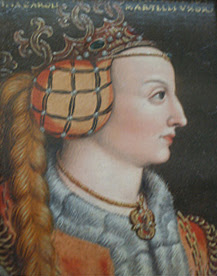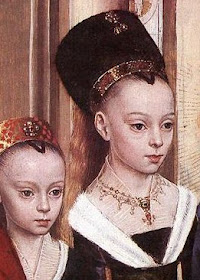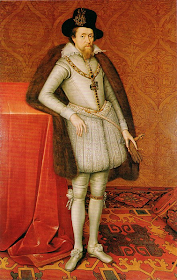First a necessity then a status symbol and finally a fashion statement,interpreted in many ways these days,fur was the fabric men used to cover and adorn their bodies.Mink,sable,ermine chinchilla and other exotic skins were worn by the nobility while the common people wrapped themselves in lamb and calf to keep warm.Since exotic furs were hard to produce and come by they were ruinously expensive and could only be afforded by royalty,the nobility and the clergy.In the 13th c it is reported that "some barons were known to mortgage their lands to buy ermine for their wives".The white and black tail of the ermine was used for making royal ceremonial robes and the distinctive fur is symbol of royalty,nobility and high status
Coronation of Louis VIII of France and Blanche of Castile,c. 1223
Coronation of Louis VIII of France and Blanche of Castile,c. 1223
Louis VIII of France and Blanche of Castile,c 1220
Clementia of Habsburg,Queen of Hungary in c. 1250 by Antoni Boys
Marguerite of Provence,Queen of France in c. 1250
Maria of Brabant,Queen of France at her coronation in c. 1275
Wedding of Edward II of England and Isabella of France,1308 by Jean Wavrin
Wedding of Edward II of England and Isabella of France,det.
Wedding of Charles IV of France and Marie of Luxembourg,c. 1320 by Jean Foquet
Elisabeth Richeza of Poland,Queen of Bohemia in c.1330 by Antoni Boys
Isabella of France Queen of England,c. 1350
The Queen of Sheba,c. 1405
A heroine,c. 1420 by Jacques Iverny
A hero and a heroine in 1420 by Jaques Iverny
When the bourgeois classes started getting wealthy in the 14th c and started to adopt the manners and ways of the aristocracy and dress themselves in expensive furs many countries passed sumptuary laws forbidding the rising merchant classes to wear furs like sable and ermine,stipulating that is is reserved only for the nobility in a bid to differentiate the blue bloods form the plebs.The middle classes compensated by wearing furs from otters foxes and other small rodents.In the middle ages the blueish,gray and white fur of the squirrel as well as the skins of leopards,tigers other big cats were greatly appreciated and were used to trim dresses,capes and other garments.
Blanche of Lancaster,Electress Palatine in 1430
Offering of the heart,early XV century Flemish tapestry
Man wearing an ermine lined coat in the Capodlista Codex manuscript,
early XVth century
early XVth century
Historie de Helayne,early XV illumination,French
Like many other sumptuary laws this one was obviously very hard to police and impose so it was not strictly observed.With the merchants getting wealthier and buying for themselves titles,lands and knighthoods the line between nobility and bourgeoisie became thinner and thinner and by the end of the XVIII century such distinctions became obsolite.In fact the nobility became poorer in the coming centuries as the middle class became wealthier and so became main consumers of luxury goods.
Arnolfini marriage,1434 by Jan van Eyck
Arnolfini marriage,det.
Barbara of Celje,Holy Roman Empress with her daughter Elizabeth of Luxembourg Queen of Bohemia behind ,c. 1440 by the Meister der Chronik des Konzils der Kostanz
Seven Sacraments Altarpiece,c. 1440 by Rogier van der Weyden
Jacqueline of Bavaria Countess of Hainaut,c. 1440 Dutch school
John Talbot Earl of Shrewsbury in 1445 from the Shrewsbury Book
Marriage of Henry VI of England and Margaret of Anjou in 1445 from Vigiles de Charles VII
Catherine of Cleves Duchess of Guelders in c 1450 from the Hours of Catherine of Cleves by Meester van Catharina van Kleef
Ladislaus the Posthumous,Duke of Austria and Magdalena of France,1447
The presentation in the temple,1463 by Hans Memling
The presentation in the temple,det.
Eleanor of Portugal Holy Roman Empress,1468 by Hans Burgkmair the Elder
Eleanor of Portugal,Holy Roman Empress in c. 1460
Renaud de Montauban,1462-1470
Adoration of the Kings by Hans Memling,1470
Janos Corvinus,1486 by Baldassare Estens
Anne of Beaujeu,Duchess of Bourbon at prayer with her daughter Suzanne
in 1489-90 by the Master of Moulins
Tapisseries de la Vierge,XV century
Tapisseries de la Vierge,XV century
The Triumph of Death of the Three fates,early XIV century tapestry
Wedding,early XVI century
Anne of Brittany Queen of France,1503
Fortune teller with a Fool,1508-1510 by Lucas van Leyden
Lorenzo de Medici Duke of Urbino,1520 by Raphael Sanzio
Isabella I Queen of Castile,1520 by Gerard David
Madeleine of Saxony Electress of Brandebourg,1525 by Lucas Cranach the Elder
Lucretia,1520s by Lucas Cranach
Lucretia,c. 1520s by Lucas Cranach the Elder
The Chess Players,1530 by Guilio Campi
Charles V Holy Roman Emperor,1532 by Jacob Seissengger
April,1530s by Simon Benning
April,det.
Early XVI century French
In the XVth century a curious fur garment became popular.The zibellino was made either of a whole skinned sable or a marten and was worn around the neck,the waist or it was simply held in the hand.The animal's face was made by a goldsmith with jewels for eyes and ears and paws hung with pearls.The main purpose is debated today but it's been thought that it acted as a distraction for fleas and kept them away from the body but not everyone is so sure that ladies wanted to advertise their vermin problem so publicly.
.
Etchings of a design for the head of a zibellino,1562 by Erasmus Hornick
Jeweled head of a zibellino,1550 Italian
Painted tablet,1533 by Martin Schaffner
Giulia Gonzaga in mourning dress,1535 by Cristofano dell'Altissimo
Isabella d'Este,1536 by Titian
Portrait of a woman,1539 by Lucas Cranach the Elder
Portrait of Count Fortunato Martinengo Cesaresco by Moretto da Brescia,1540-42
Edward VI of England,1550 by William Scrots
Isota Brembati,1552 by Moroni
Queen Mary I of England and Princess Elisabeth entering London,1553
Taufe Christi,1556 by Lucas Cranach the Elder
Patrician Lady,1557 by Sofonsiba Anguissola
Portrait of a woman,1560 by Francesco Beccaruzzi
Alessandro Farnese,1560 by Sofonsiba Anguissola.
Alessandro Farnese,c. 1560 by Anthonis Mor
Antonio Navagero,1565 by Moroni
Venetian woman,1575 from Mores Italiae
Frances Sydney,Countess of Sussex in 1570-75
Catharina MIchaela of Spain Duchess of Savoy,1577 by El Greco
Anna Radziwill,1583
Elisabeth I in parliamentary robes,1585 by Marcus Gheerarets the Younger
Lady,1588 from Album Amicorum of a German soldier.The lady has a white
zibellino possibly made of squirrel fur on her arm
Lady form Padua,1595 from Album Amicorum of a German soldier
French lady,1595 from Album Amicorum of a German soldier
Lucy,Countess of Bedford in 1595
Elizabethan lady,1595 by William Segar
Gonzaga Family at worship,1604 by Rubens
Isabella of Valois,Queen of Spain in 1605 by Juan Pantoja de la Cruz
James I of England,1606 by John Critz
Elisabeth Harnister,1611
Lucy Harrington,1616
Catherine Lady Stanhope,1636 by van Dyck
Elisabeth,Lady Thimbleby,1637
Lucy Percy,1637 by van Dyck
Henrietta Maria of France Queen of England,c. 1630
Portrait of a young girl as Flora,c. 1640 by Cornelis van Poelenbuch
Portrait of Elisabeth von Werdt in a fur hat by Hanz Jacob Dunz,1642
Marie Jeanne,Duchess of Savoy in 1666
Catherine of Braganza,Queen of England in 1667 by Jacob Huysmans
Portrait if a lady,c. 1670 by a follower of Beaubrun
Archduchess Maria Anna Josepha of Austria,Princess Palatine,1678
Margahareta Fries,c. 1670 by Conrad Meyer
Young lady,1672 by Frans van Mieris
Mary II of England,1683 by Caspar Netscher
Marie Caddene,1684 by Rigaud
Cleophea Lavater,1686 by Conrad Meyer
Duchess Violante Beatrice of Bavaria,1690 by Nicolo Cassana
Daughters Henri Prince of Conde,1690 by Gobert
Sobieski family,1693
Lady and her daughter,1720-30 by Coypel
Maria Amalia of Saxony Queen of Spain,1738 by Louis de Silvestre
Princess Mary of England,Landgravine of Hesse Kassel,c. 1750
Farinelli and friends,1750-52 by Jacopo Amigioni
Louis Dauphin of France,1765 by Roslin
Franciska Krasinicka,c. 1760
Portrait of a gentlemen,c. 1760 by Guiseppe Baldrighi
Ana Sheremetova,1768 by Ivan Argunov
Gaetano Pugnani by an artist of the Italian school,1755-70
Carl August of Grand Duke of Saxe-Weimar-Eisenach,1769 by Ziesenis
John Scott Banks,1774 by Batoni
Mary Lady Hervey,c 1770 by Zoffany
Woman reading a letter,1775 by Pierre-Alexandre Wille
Two young ladies,c. 1770
Ludwika Zamoyska,1780 by Bacciarelli
Richard Miles,c. 1780 by Batoni
Maria Amalia,Queen of Saxony by an unknown Saxon painter,c. 1780
Portrarit of a couple,c. 1780 by Joseph Melling
In the XVIII century fur,imported mainly from Russia,was used to line winter dresses,capes and coats and also muffs were made either entirely of fur or were lined with it to keep the hands warm.Fur hats were worn mainly by men,sometimes by women in Russia,but the ladies wore fur boas which they wrapped around their necks and shoulders.
Madame de Villeneuve,1780-90 by Jean Louis le Barbier the Younger
Johanna Sieveking,1784
Ignacy Potocki,1785 by Anna Rijecka
Lady Rowley,1785 by Hoppner
Portrait of a lady,1785 by Alessandro Longhi
Madame Mole-Reymond,1786 by Vigee Le Brun
Madame Stroganova,1787 by Voille
Marquise d'Aramon,c 1789 by Mosnier
Queen Friederike Luise of Prussia,1780-90
Woman with a ruff,c. 1790 by Gauffier
Mary Fagan,1790
Elizabeth Farren,1790 by Lawrence
Archduke Joseph Palatine of Hungary,1800
Lady reading,1886 by Gabriel Schachinger
Natalie Barney,1896 by Pike Barney
Zinaida Yusupova,1894 by Francois Flaming
Camara,1890 by Paul Cesar Hilleu
Ruby Miller,1890 by James Jebusa Shannon
Peggy Lettelier,1895 by Paul Cesar Helleu
Madmoiselle Vaughan,c. 1890 by Helleu
Lady in fur wrap,c. 1890 by Clemens von Pausinger
The fashion for carrying a zibellino had died out in the first few years of the XVIIth century but it made a slightly modified reappearance in the XIX and XX centuries with ladies wearing fox skins around their necks.Wearing of furs is still associated with wealth even today and it is highly frowned upon due to animal rights movements and the option faux fur becoming the more conscientious way to get the sumptuous look.
Johanna Staude,c. by 1900 Klimt
Sybil Rocksavage,c. 1900
Girl form Moscow,1903 by Ryabushkin
Lady,1905 by Leon Bakst
Mrs Edward-Redfield,c. 1910 by Wiles Irving Ramsay
Mrs.St George,c 1910-20 by William Orpen
Portrait of a lady,c. 1920 by Nicolae Vermont
Yvonne Legeay,1925 by Charles Gesmar
Portrait of a lady,1935 by Marcello Dudovich












_1420+squirrel+fur+on+sleeve.jpg)






.jpg)

























.jpg)











































.jpg)



























+at+the+Bowes+Museum,+c.+1770s.jpg)
+n%C3%A9e+Poniatowska+bacciarelli+1780+90.JPG)









.jpg)


















.jpg)




